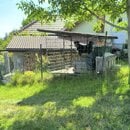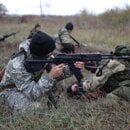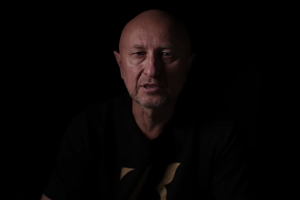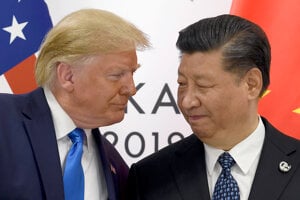1500 years ago
A king in India named Kaid, who had built a huge empire, was sick at heart. He called his minister, Sassa, to him and said : "Day and night I think about my past battles, I dream of conquests and invasions, I can't sleep for thinking about imaginary wars and victories. But I have no more enemies, and it is a sin to make war without cause. What can I do to regain my peace of mind?"
The minister thought of a game which he had learnt from a Greek soldier. He taught the rules to the king, who found the game so engrossing, such a perfect substitute for war, that he was a happy man again. He asked Sassa :
"How can I reward you? Gold? Jewels? Perhaps you want to marry one of my daughters? Choose anything you like." But Sassa said :
"Take a grain of rice and place it on the first square of the board. Put two grains on the second square. Keep going, doubling the number of grains each time, until you have covered all the 64 squares on the board."
At first they laughed at Sassa for his modesty and simplicity. But then they discovered that the rice would exceed all the wealth in the known world.
A mystery
The game, if you haven't guessed, was chess. It's interesting that in all the various legends of chess's origins the game is always said to come from somewhere else. Chess has a number of known ancestors- the four-player Indian game Chaturanga among them - but its ultimate place and date of birth are still a mystery. India, China, Persia, Greece? Nobody knows.
What is definitely true in the story is the point Sassa was making with his rice. Chess is pretty much infinite. We don't know the number of possible games even today, when a supercomputer can beat the World Champion. There's an Indian proverb: "Chess is a lake in which a mosquito can bathe - and an elephant can drown".
Children like to command a little wooden army, and even adults like to play Napoleon. That's how they get started. Later, players realize the technical complexity and finally, they see the game's awesome artistic beauty. It's a unique combination of war game, sport, science and art.
A mirror of history
In its long journey around the world, chess has borrowed from the cultures that took it in. The West plays with bishops, knights and queens, because they were powerful people in medieval Europe when chess became popular. But in the East, including Russia, these pieces are named the elephant, horse and ferz (minister), as in Indian Chaturanga.
Chess moved west but it also moved East, and its Eastern versions - Chinese Xaing-pi and Japanese Shigo - also reflect history. In Shigo, some of the pieces can even change sides, like mercenary soldiers in the age of the Samurai.
The players, too, reflect the spirit of their times. Anatoly Karpov, who dominated the game in the 1970s, played Cold War chess - Iron Curtain chess. He was slow and defensive but almost impossible to beat. Garry Kasparov took the title from him in 1985, on the eve of great changes in the USSR. He played Gorbachev chess, perestroika chess. Radical solutions to problems, and risky moves with unpredictable results. His style was like a breath of fresh air.
An extreme sport?
In my passion for chess, I'm in good company. Charlemagne, King Henry II, Napoleon, Tolstoy, Rousseau, Nabokov and Che Guevara. Chess players all.
The French artist Marcel Duchamps took his obsession further. He took three years off from art to become a chess master, and played for France in the Chess Olympiad. He was prouder of his chess mastery than all his artistic achievements.
With all these kings, artists and writers playing chess, you might get the idea that chess is the ultimate civilized pursuit. But you'd be wrong.
A Scandinavian manuscript, 900 years old, tells of how one player, who lost a game, picked up the board and smashed his opponent on the head with it. Boards were made of stone in those days. Ouch.
Grandmasters have called it "a blood sport", "like a fight to the death with broken bottles" and "very dangerous - you have to kill people."
If you agree with the old saying that life is too short for chess, play blitz chess. Five minutes on the clock. Non-players think chess is slow and boring, but blitz is a high adrenaline sport. And as aggressive as any martial art. In parks in Russia, where they gather in summer to play blitz, the players don't just take pieces, they knock them off the board onto the ground. And in the classic game, even world championship players have been known to kick each other under the table.
From the boxing ring to the chess board
With all this aggression, and the stories of nervous breakdowns among chess players, it's worth remembering that chess can heal as well as harm. My own favourite chess story is that of John Healy. His autobiography, The Grass Arena, was made into a great film by the BBC. Healy was a failed boxer who became the most serious kind of alcoholic. He became homeless. The bottle nearly killed him. But in prison, he discovered chess, and managed to give up drinking completely. He became a successful chess player, journalist and writer.
Healy is played in the film by the British actor Mark Rylance. It's the performance of a lifetime - chess makes surprisingly good cinema. There is a moving scene where Healy tries to find the words to describe how his life has changed. "It's like boxing again...but not with fists... with the mind." King Kaid, fighting his imaginary battles, would surely have recognized him.
Vocabulary
5 words/phrases from the text:
- board: the surface on which you play the game
- squares: the black and white areas which form the playing surface
- pieces: the things that you move around while you play the game
- defensive: a way of playing that means you don't take any risks
- opponent: the person who plays the game with you
Exercise one.
Vocabulary gap fill. Now use the 5 words/phrases to fill the gaps in the sentences below:
- He got so frustrated with the game that he knocked the ..............to the ground
- My usual ....................didn't turn up this evening so I'm playing against someone else
- There are sixty-four ......................on a chess board
- I haven't played for many years but I still remember how to move the .................
- He's not a very exciting person to play against. He has a very ....................... game
Exercise two.
Comprehension: word order. Put the words below in order to make correct sentences about the text.
- originally / is sure/ comes from/ chess/ nobody/ where/
- the number of /there is/ games/ no limit / possible / to /
- in different/ pieces/ parts/ chess/ different names/of the world/have
- can sometimes/games/violent/chess/get
- of his addiction/cured/playing chess/one person/to alcohol
Grammar.
Conditionals (2)
Third conditionals and mixed conditionals
Conditionals are sentences with two clauses - an ‘if clause and a main clause - that are closely related. Conditional sentences are often divided into different types.
Third conditional
Third conditional sentences describe the past. They describe something that didn't happen.
If I'd studied harder at school I would have gone to university. He didn't study very hard and he didn't go to university.
We wouldn't have got lost if you hadn't given me the wrong directions.
She might have finished the exam if she'd had more time.
In third conditional sentences, the structure is usually if + past perfect and would + perfect infinitive (e.g. have done). It's not important which clause comes first.
Notice that other modal verbs can be used instead of ‘would' (e.g. ‘could', ‘might' ‘may')
Mixed conditionals
In mixed conditional sentences the time in the ‘if' clause is not the same as the time in the main clause. There can be various combinations.
If he'd gone to university he might have a better job.
He didn't go to university (past)
He doesn't have a very good job. (present)
This sentence shows the present consequences of a past action.
If I'd won the competition I'd be going to Florida next week.
She didn't win the competition (past)
She isn't going to Florida (future)
This sentence shows the future consequences of a past action.
If he didn't have to work tomorrow he wouldn't be so miserable today.
He has to work tomorrow (future)
He's miserable. (present)
This sentence shows the present consequence of a future event.
Exercise
Use a conditional sentence to combine the information from the two sentences.
- He missed the penalty. We lost the game.
- I didn't know you were coming. I didn't buy any cakes.
- I ate too much chocolate. I feel terrible.
- You took a long time getting ready. We're late.
- You saw the car. It didn't hit us.
Quiz Question 20
First name of King who had six wives.
Little wooden armies - key
Vocabulary
- board
- opponent
- squares
- pieces
- defensive
Comprehension
- Nobody is sure where chess originally comes from
- There is no limit to the number of possible games
- Chess pieces have different names in different parts of the world
- Chess games can sometimes get violent
- Playing chess cured one person of his addiction to alcohol
Grammar
- If he hadn't missed the penalty we wouldn't have lost the game / If he'd scored the penalty we would have won the game.
- If I'd known you were coming I would have bought some cakes.
- If I hadn't eaten too much chocolate I wouldn't feel terrible/I would feel better.
- If you hadn't taken a long time getting ready we wouldn't be late.
- If you hadn't seen the car it would have hit us.































